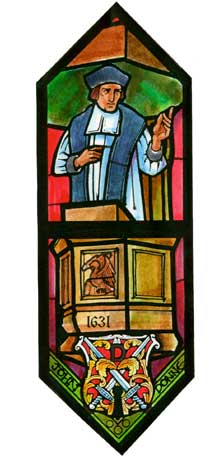|
|
|||

|
|||
John Donne Window
 When Elizabeth I died (1603), the Stuarts inherited the English throne, bringing with them a strong belief in the divine right of kings. At the same time, Puritans were gaining ground in Parliament, and the mix was explosive; civil war ensued. The king, Charles I, was defeated, and later beheaded by a radical arm of Parliament. Oliver Cromwell took over the country, attempting but failing to create a republic. Several years passed before the monarchy and Church of England were restored. During this difficult time a group of Anglicans known as the Caroline (relating to Charles) Divines was building on the work of Richard Hooker to further define the Anglican “middle way.” Like Hooker, they saw Anglicanism as a return to the simplicity and order of the primitive Church. These men, by their scholarship, courage, and purity of life, preserved the English Church and created a foundation on which future generations would build. John Donne was associated with this group of churchmen. The son of a Roman Catholic ironmonger, Donne had a troubled, reckless youth. After studying at both Oxford and Cambridge, he became a lawyer, working as the secretary to Sir Thomas Egerton. He enjoyed the high life, and became popular among the elite through his flattering poetry. But he left in disgrace after it was discovered that he had secretly married Egerton’s niece. The years that followed were difficult, and Donne turned to writing religious poetry. Eventually he became Anglican, and after a number of years, and much persuasion, was ordained a priest. It was then that Donne said his spiritual conversion began: as he immersed himself in Scripture, prayer, and the Church Fathers, his heart caught fire. His once cavalier attitude was transformed into a deep love and fervor for God, his talent now poured into brilliant sermons and poetry. He became noted for his “divine sonnets” and passionately wrote of the love of God. His most famous lines were penned as he thought he was dying: “Never send to know for whom the bell tolls; it tolls for thee.” John Donne became the dean of St. Paul’s Cathedral. Our window shows him in the pulpit, preaching, with the seal of the dean shown below. The eagle on the pulpit symbolizes Donne’s soaring oratory, through which many lives were profoundly changed.
Like Stars Appearing: The Story of the Stained Glass
Windows of St. George's Episcopal Church, Dayton, Ohio | |||
|
|||
